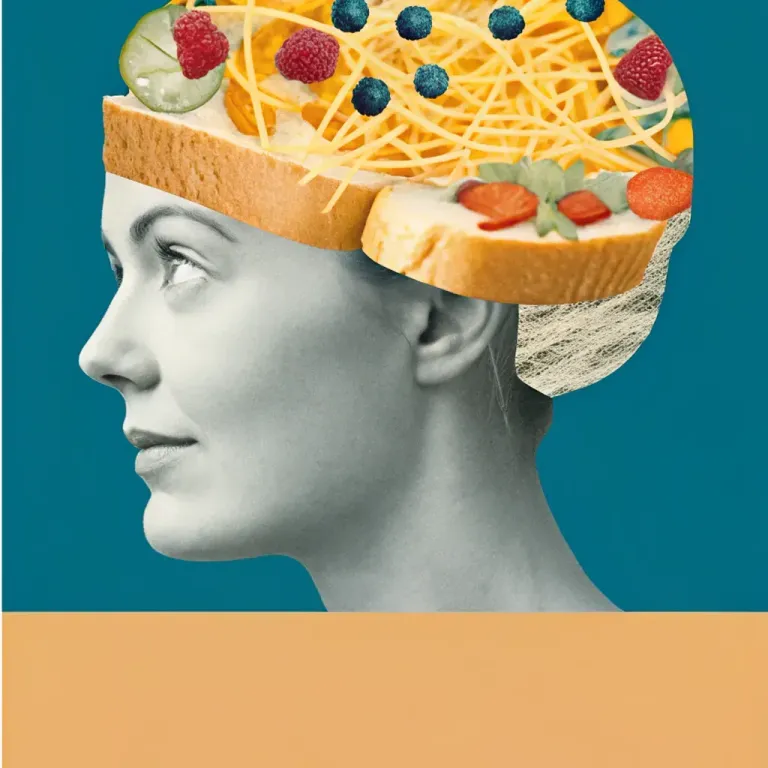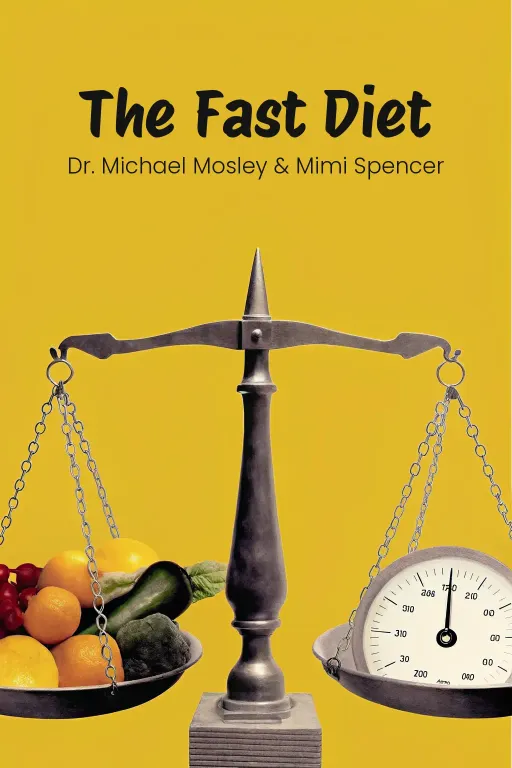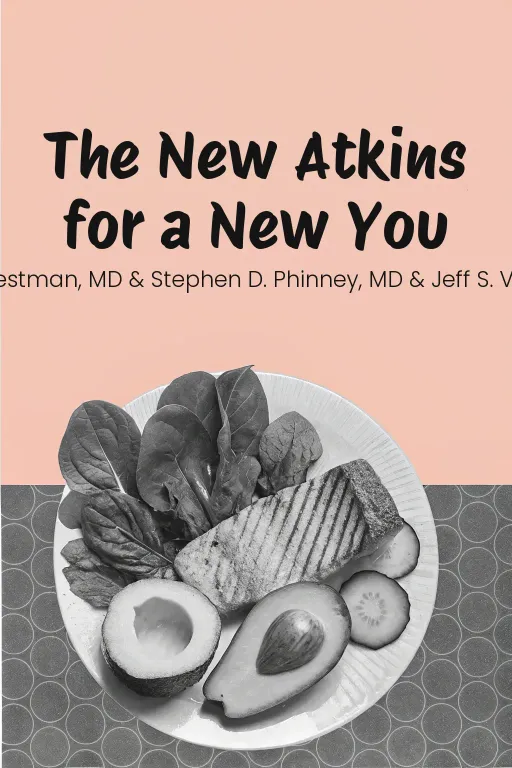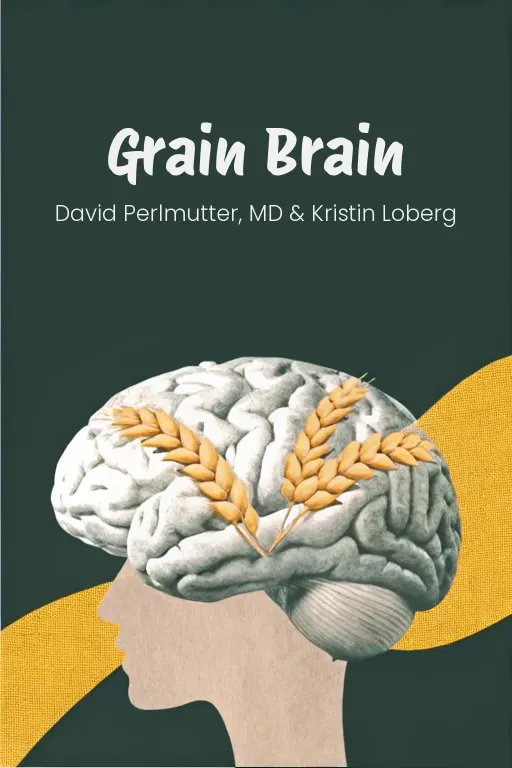
Eat Smarter: Hack Your Brain Health Now!
Podcast by Beta You with Alex and Michelle
The Surprising Truth About Wheat, Carbs, And Sugar — Our Brain’s Silent Killers
Eat Smarter: Hack Your Brain Health Now!
Part 1
Alex: Hey everyone, welcome back! Today, we're tackling something that could totally change the way you look at your food—and your brain. Ever stop to think that your everyday bread or pasta could be messing with your mood, your memory, or even your brain's long-term health? Michelle: Messing with my brain, huh? Alex, if my beloved pizza is secretly turning me into a Walking Dead extra, you've got some explaining to do. So, give it to me straight. Alex: Well, that's exactly what Grain Brain by Dr. David Perlmutter is all about! It dives headfirst into how our modern eating habits—you know, all those carbs and gluten—are seriously messing with our brains. He explains how constant inflammation, which is triggered by these foods, is linked to brain issues like Alzheimer's, depression, and ADHD. And get this: the solution isn't what we've always heard. It’s not cutting back on fat; it’s cutting back on carbs and loading up on healthy fats! Michelle: Wait, more fats, fewer carbs? Talk about turning conventional wisdom on its head! So, what’s on the agenda for our little brain food chat today? Alex: We're breaking down three big things: First, how our typical diet might be secretly working against our brainpower. Second, why gluten and fats are the stars of this food story—one's the bad guy, and the other's the unlikely hero. And finally, a real, workable plan for boosting our brain health. We're talking food swaps, easy lifestyle changes, and a clear path to a sharper, healthier you. Michelle: Okay, color me intrigued. Let's dive into these brain-food connections, one carb at a time.
The Impact of Diet on Brain Health
Part 2
Alex: So, let’s dive into the core of Dr. Perlmutter’s argument: the connection between what we eat and how our brains function. What “really” struck me is how he emphasizes chronic inflammation as a key driver of so many neurological issues. It's, well, kind of scary, to think about how much our modern diets contribute to this hidden, internal inflammation. Michelle: Okay, "inflammation" definitely sounds like something I want to avoid. But, uh, how do my innocent morning pancakes fit into all this? I mean, what's the deal with carbs and gluten suddenly being the bad guys? Alex: Well, it's about the cumulative effect over time. When you eat a lot of refined carbs or gluten-rich foods, you get these blood sugar spikes, which might seem normal at first. But, repeatedly doing that sets off a whole chain reaction. High blood sugar leads to glycation, where sugar molecules attach to proteins and fats. This creates what we call Advanced Glycation End Products, or AGEs, which lead to oxidative stress and, you guessed it, inflammation. And the thing is, this inflammation doesn't just stay in your stomach; it affects your brain, too. Michelle: So, it's like starting a small fire in your gut, and then the smoke drifts upwards and messes with your brain? Alex: Precisely! And the brain is super sensitive to inflammation. Dr. Perlmutter presents evidence that chronic inflammation is linked to Alzheimer’s, depression, even ADHD. He actually calls Alzheimer’s "Type 3 diabetes" to emphasize just how much sugar mismanagement can lead to neurodegenerative diseases. Michelle: Wow, that's... unsettling, to say the least. But what about gluten? Is gluten just riding sugar's coattails, or does it have its own evil plan? Alex: Gluten is more than just a sidekick. For those who are sensitive to it – even if they haven't been officially diagnosed – it can cause "leaky gut." Basically, it compromises the lining of your intestines, allowing unwanted molecules to leak into your bloodstream. This triggers inflammation throughout the body, brain included. Even without digestive symptoms, people can experience brain fog, mood swings, or memory problems because the brain isn't immune to the inflammation the body is fighting off. Michelle: So, gluten and sugar are like two supervillains teaming up to wreak havoc on our systems? Alex: Exactly! And it’s insidious because we've been taught that things like whole grains or low-fat, high-carb diets are healthy. Dr. Perlmutter argues that this is the opposite of the truth when it comes to long-term brain health. Michelle: Right, which brings us back to the rise of neurological disorders you mentioned. But, here's a question: if carbs and gluten are so terrible, what did people eat a century ago when these diseases weren't as prevalent? Alex: That’s a great question. Dr. Perlmutter actually compares traditional diets with what we eat now. In the past, people ate more healthy fats and fewer carbs. Think of diets rich in animal fats, fish oils, and whole foods – long before processed snacks and cereals became so common. Over the last century, we've shifted to low-fat, high-carb diets, pushed by guidelines and marketing, which has led not only to obesity and diabetes but also a big increase in cognitive problems. Michelle: So, a hundred years ago, people were eating butter without guilt and avoiding the cereal aisle, and their brains were happier for it? Makes you wonder who decided carbs should be crowned the health food king in the first place. Alex: That’s another major point in the book: the commercial and political forces influencing nutritional guidelines. But let’s not get too far off track. What's important is that Dr. Perlmutter argues strongly that the brain thrives on fats, not carbs, and that shifting our diets back to high-fat, low-carb profiles might be key to reversing these health crises. Michelle: You know, speaking of fats, that part was hard for me to wrap my head around. We’ve been told for decades to fear cholesterol and avoid fats. Are you saying the brain actually needs them? Alex: Absolutely! The brain is about 60% fat, so it needs healthy fats to maintain its structure and function. Cholesterol is crucial for repairing neurons and forming synaptic connections – the pathways that allow your brain to communicate. Dr. Perlmutter even cites studies showing that people with higher cholesterol levels had better cognitive function, challenging the idea that low cholesterol is always best. Michelle: Hold on, so cholesterol isn’t the enemy here? This feels like a complete 180. I mean, imagine unlearning decades of advice and actually embracing butter and salmon. Alex: It “really” is a shift in perspective. And it’s clear when Dr. Perlmutter looks at traditional, high-fat diets in places like the Mediterranean or Southeast Asia. Their staples – omega-3-rich fish, olive oil, coconut oil – are considered healthy, not dangerous. And guess what? They also have much lower rates of Alzheimer’s and neurodegenerative disorders. It's a stark contrast to carb-heavy Western diets. Michelle: Okay, so fats are the unsung heroes. But let's be real, telling people to eat more fat and cut carbs sounds great in theory, but is it practical? How does Dr. Perlmutter suggest we actually do this? Alex: Perfect timing! His advice is all about small, doable steps. He suggests reducing or cutting out processed foods and replacing them with whole, nutrient-rich options. Instead of cereal, try eggs cooked in olive oil with avocado. Instead of soda, drink water or tea. And he emphasizes the importance of sleep and exercise, which boost the benefits of these dietary changes. Michelle: I like that it’s practical. So, no need to throw out everything in your pantry, just start swapping sugary snacks for brain-friendly alternatives? Alex: Right. It’s about creating sustainable habits. And the results speak for themselves: lower inflammation, better cognitive function, even emotional stability. It’s about taking control over something we often ignore – how our food choices affect our brain health. Michelle: Okay, Alex, I think I’m starting to see the bigger picture. So, let’s get into specifics. What does this brain-boosting menu actually look like?
The Role of Gluten and Healthy Fats
Part 3
Alex: So, understanding what foods can trigger brain issues leads us to look at gluten and its effects on our brain health, right? It’s a big focus in "Grain Brain." Interestingly, it's not just about digestion; it can directly impact the brain, even in people without celiac disease. Michelle: Okay, I get why gluten isn’t the brain’s best friend. But how does it actually go from our food to messing with our brains? What’s the biochemical process there? Alex: It all comes down to inflammation. Gluten can mess up your gut lining, leading to what we call "leaky gut." This allows molecules that shouldn’t be in your bloodstream to get through, triggering a widespread inflammatory response. And since the gut and brain are closely linked via the gut-brain axis, this inflammation affects the brain too. Michelle: Gut-brain axis? Sounds like something out of a sci-fi movie! What exactly is that? Alex: Think of the gut-brain axis as a superhighway connecting your digestive system and your brain. It’s controlled by the vagus nerve and involves neurotransmitters and hormones. So, when your gut is inflamed, the brain gets those stress signals, which lead to symptoms like brain fog, anxiety, or even migraines. Dr. Perlmutter even has a case where someone suffered from severe migraines for years. No traditional treatment worked, but when they cut out gluten, the headaches disappeared and their mind became clear. Michelle: That’s incredible—and a little frustrating for those who take painkillers without realizing the solution might be in their diet. Why isn't this a more common approach in healthcare? Alex: That's a great point. Part of the problem is that gluten's effects are usually studied in relation to digestion, so many doctors don't consider it when diagnosing neurological issues. Plus, people often want a quick fix, like a pill, and don’t realize how impactful a simple dietary change can be. Michelle: So gluten isn’t just bad in bread – it can quietly mess with our cognitive functions even if we have no stomach issues? That's devious. What about people who don’t have gluten sensitivity or celiac disease? Are they safe? Alex: You’d think so, right? But research suggests otherwise. Dr. Perlmutter mentions studies showing that even people without diagnosed gluten sensitivities can experience low-level inflammatory reactions. The damage might be subtle—like constant brain fog or mild cognitive decline—but it adds up over time. Michelle: Okay, I get it. Gluten is like a sneaky saboteur, slowly taking down our brain cells. Now, let’s switch to the hero of the story: fats. After years of fearing fat, I need some convincing. Why are they so important for brain health? Alex: Absolutely. The idea that fats are good feels radical because it goes against decades of dietary advice. But the science is clear: your brain is mostly fat—about 60%! Cholesterol and saturated fats, once seen as the enemy, are crucial for the structure of neuronal membranes and synaptic connections. These are the physical structures your brain needs to think, remember, and feel. Michelle: So, when we cut fats, we’re essentially starving our brains? Alex: Exactly. Dr. Perlmutter points out that when you deprive your body of healthy fats, you’re hindering its ability to function properly. He cites the Framingham Heart Study, which showed that people with higher cholesterol levels actually performed better cognitively and were less likely to develop dementia. It’s a complete turnaround from the low-fat advice we've been following. Michelle: Okay, but there are different kinds of fat. Are we talking about eating a stick of butter, or is it more nuanced than that? Alex: Definitely more nuanced, although butter isn’t totally off-limits! Dr. Perlmutter emphasizes healthy fats found in avocados, olive oil, nuts, seeds, and fatty fish like salmon. These fats provide energy and crucial nutrients, like omega-3 fatty acids, which reduce inflammation and promote neuroplasticity—your brain’s ability to rewire itself. Michelle: Neuroplasticity sounds like something we should all be striving for. If our brains can repair and reorganize themselves with the right tools, that’s huge. Alex: It is! Omega-3s also support the production of BDNF, brain-derived neurotrophic factor, which is basically fertilizer for new brain cells. So, your diet doesn’t just maintain your existing knowledge—it helps create new mental potential. Think about what that means for people who want to age well, stay focused, or recover from neurological issues. Michelle: Alright, I’m sold on fats. But how do we make this work in real life? Most people aren’t going to swap their cereal for salmon. Alex: Fair point. Dr. Perlmutter advocates for gradual, realistic changes. Start by reducing processed foods, refined carbs, and hidden sources of gluten like sauces. Then, add healthy fats to your diet with simple swaps. Use coconut oil or butter instead of vegetable oils, snack on nuts instead of chips, and add avocado to salads or sandwiches. It becomes a habit over time. Michelle: So, it’s not about totally giving up carbs, but more about replacing them with brain-boosting alternatives as you go. I can get behind that. How long before someone notices a real difference? Alex: Results vary, but many people report changes in just a few weeks: better focus, sharper memory, even more stable moods. And in the long run, it’s about reducing the risk of serious neurological conditions like Alzheimer’s. It’s the ultimate example of prevention being better than cure. Michelle: Got it. Gluten is like a silent inflammation bomb, while fats are the building blocks that keep our brains running smoothly. Sounds like a good reason to rethink not only what we’re eating, but why.
Lifestyle Strategies for Cognitive Resilience
Part 4
Alex: So, we've laid out the dietary groundwork, and now we're diving into how to actually do this, how to reshape your brain health through practical lifestyle changes. Dr. Perlmutter, in Grain Brain, stresses that overhauling your diet is the crucial first step, but it's really just one piece of the puzzle. He advocates for an integrated approach, combining diet, exercise, and sleep, to build cognitive resilience and really minimize the risk of neurological decline. Michelle: Okay, so we're going from theory to action items. This is giving me flashbacks to those fitness regimes that kick off with, "Toss all the junk food," and suddenly you're spending your whole weekend prepping meals! Please tell me we're not talking about some all-consuming lifestyle transformation that takes over your whole life. Alex: Not at all, Michelle! The brilliance of Dr. Perlmutter's plan lies in its structure – it's a structured, four-week roadmap that makes these changes really feel manageable, doable, and sustainable. Each week hones in on a specific lifestyle aspect: Week 1 is all about dietary shifts, Week 2 brings in exercise, Week 3 is about refining sleep, and Week 4 is where you pull it all together into a cohesive lifestyle. Michelle: Alright, spell it out for me. What would a typical person expect during that Initial Week? Alex: Week 1 involves making some dietary adjustments to establish a really strong, brain-compatible foundation. This means saying goodbye to the usual culprits – gluten, refined carbs, processed foods – and embracing nutrient-rich, healthy fats and low-carb options. He provides you with recipes and meal suggestions to smooth out the transition, such as a spinach and cheese frittata with antioxidant-packed berries for breakfast. These types of meals stabilize blood sugar and reduce inflammation as well. Michelle: I have to be honest, isn't ditching gluten and carbs cold turkey going to be, well… a bit painful? What happens when you feel a strong craving for pasta? Alex: You're absolutely right – there's usually an adjustment period. Dr. Perlmutter addresses this upfront. Many people do experience withdrawal symptoms, things like brain fog or intense cravings, particularly in the first few days. He actually draws a comparison to detoxing from caffeine or nicotine – it's simply your body recalibrating after years of sugar spikes. The real key is really focusing on the long-term benefits rather than just short-term discomfort. Michelle: And you mentioned substitutions – so realistically, how do we trick our brains into not feeling like we're depriving ourselves? Alex: That's a great question. The plan incorporates flavorful, low-carb swaps designed to keep your meals satisfying. For example, you could opt for zucchini noodles with pesto in place of traditional pasta. Or snack on nuts instead of crackers or chips. There's even a recipe for avocado chocolate mousse! You get to indulge in the richness of dessert without any of the sugar overload. Michelle: Avocado chocolate mousse? Okay, you have my attention now! Alex: I know it sounds a little out there, but it’s a total game-changer! Healthy fats, no added sugar... It really exemplifies how eating for your brain doesn't have to be about deprivation, or boring! Michelle: Alright, you've certainly won me over with the dessert angle. But with this high-fat focus, does he suggest supplements for people who can't always consume things like salmon or avocados every day? Alex: Absolutely. DHA, a type of omega-3 fatty acid, is definitely high on the list. Dr. Perlmutter references research indicating that higher DHA intake can reduce the risk of Alzheimer's by up to 60%. While fatty fish like salmon are a great natural source, supplements can help fill the void for those who aren't getting enough omega-3s through their diet. Michelle: Ok, so, Week 1 is pretty much a battle zone against cravings and inflammation. What does Week 2 bring? Alex: Week 2 shifts the focus to exercise. Physical activity serves as brain fertilizer, it does more than just improve your waistline. It directly supports neuroplasticity, which is the brain's ability to adapt and grow. Aerobic exercise, particularly, boosts the production of something called brain-derived neurotrophic factor, or BDNF, which helps create and maintain neurons. Michelle: Here's comes my skepticism again! Are we talking about some kind of Olympian-level workouts here, or is this something an average person can realistically stick with? Alex: No Olympian efforts required! His advice is actually refreshingly simple: aim for about 20 minutes of aerobic exercise daily. This could be a brisk walk, a bike ride, even dancing – whatever elevates your heart rate and fits into your daily routine. Consistency is more important than intensity, especially for those just starting out. And for those who want to push themselves, he also recommends strength training, to complement the aerobic work. Michelle: It's refreshing to hear exercise framed as a brain enhancer, rather than just a way to sculpt the body. What about actual solid evidence – does Dr. Perlmutter offer tangible proof that exercise can actually change the brain? Alex: Yes, he does. One study he highlights tracked elderly participants who did aerobic exercise for several months. Not only did their memory improve, but MRI scans revealed an increase in hippocampal volume—the hippocampus being the brain region crucial for learning and memory, which typically shrinks with age. Exercise didn't just slow down decline, it actually reversed some of it. Michelle: That’s pretty amazing. It's almost like discovering the fountain of youth! Alright, lead us into Week 3. What's next on this brain-health checklist? Alex: Week 3 is all about prioritizing sleep. Chronic sleep deprivation can really mess with your brain, disrupting memory consolidation, emotional regulation, and even your metabolic balance. Dr. Perlmutter shares a case study of a man who completely transformed his mental and physical health simply by fixing his sleep habits. Michelle: By "fixing" how? Most of us sleep (to some degree), so what kind of changes did this guy make to his daily routine? Alex: His problems stemmed from irregular sleep patterns and excessive screen time before bed. By cutting out screens two hours before sleep, setting up a distraction-free bedroom, and sticking to a consistent bedtime, his cognitive fog lifted and his mood stabilized within weeks. Michelle: So sounds that kind of fix doesn’t require spending much – just some self-discipline. Alex: Exactly, although it's often easier said than done! Sleep optimization is closely linked to hormonal health. Lack of sleep disrupts leptin, the hormone that regulates hunger and metabolism, thus aggravating inflammation and impairing cognitive function. Dr. Perlmutter encourages aiming for 7–8 restorative hours every night. Michelle: Alright, we've covered diet, exercise, and sleep—what happens leading into Week 4? Alex: Week 4 is all about integrating everything into a long-term, sustainable lifestyle. This is where theory meets implementation, and everyday challenges, like cravings or hectic schedules, are tackled with practical solutions. He recommends meal prepping to avoid those tempting midweek cravings, scheduling workouts as non-negotiable appointments, and establishing calm evening rituals to improve sleep hygiene. The primary goal isn't perfection; it's really about consistency. Michelle: And it all boils down to neuroplasticity, right? Those small, consistent changes add up to rewire the brain and protect it long term. Alex: Exactly. The plan empowers readers with the tools to reduce inflammation, stimulate neurogenesis, and protect their brains against decline. It's really more than just a diet; it's a comprehensive lifestyle designed around supporting and enhancing our cognitive vitality.
Conclusion
Part 5
Alex: Wow, Michelle, I feel like we've just been through a total revolution in how we think about food, our brains, and our lifestyles. In a nutshell, “Grain Brain” has really shown us that our modern diet—all those processed carbs and gluten—doesn't just affect our weight. It's quietly causing inflammation, which can seriously mess with our cognitive health. Michelle: So, everything we learned in health class was kind of backwards, huh? Alex: Pretty much! But on the flip side, if we embrace healthy fats, cut back on carbs, and focus on brain-friendly habits – like exercise and good sleep – we can see a huge change. Not just in how we feel today, but in how we age, too. Michelle: Exactly. We've gone from thinking fats were the enemy to realizing they're actually crucial for brain function. Meanwhile, carbs and gluten – those staples we thought were "safe" – are turning out to be the hidden villains behind a lot of neurological problems. And then, the best part, it's all actionable. Swapping out sugary treats, walking a little more, making sleep a priority… these small, intentional steps could be the key to “really” thriving, mentally speaking. Alex: Totally. My big takeaway? It’s never too late to make a change. Our brains are designed to adapt, and just by tweaking what we eat, how we move, and how we rest, we can pave the way for a sharper, healthier mind. That's incredibly empowering, don't you think? Michelle: Absolutely. And you know, it's a great reminder to just stop and ask ourselves: are we actually fueling the kind of life we want? Or are we, without even realizing it, making things harder for ourselves down the road? Food isn't just fuel, is it? No, it's the foundation! Alex: Exactly, yes! It’s a challenge for all of us to “really” think about what we’re eating, take control of our brain health, and create a lifestyle that supports not just living a long time, but “really” having that cognitive vitality. Let's all be mindful of the choices we're making. It's literally shaping the minds we'll have tomorrow.









